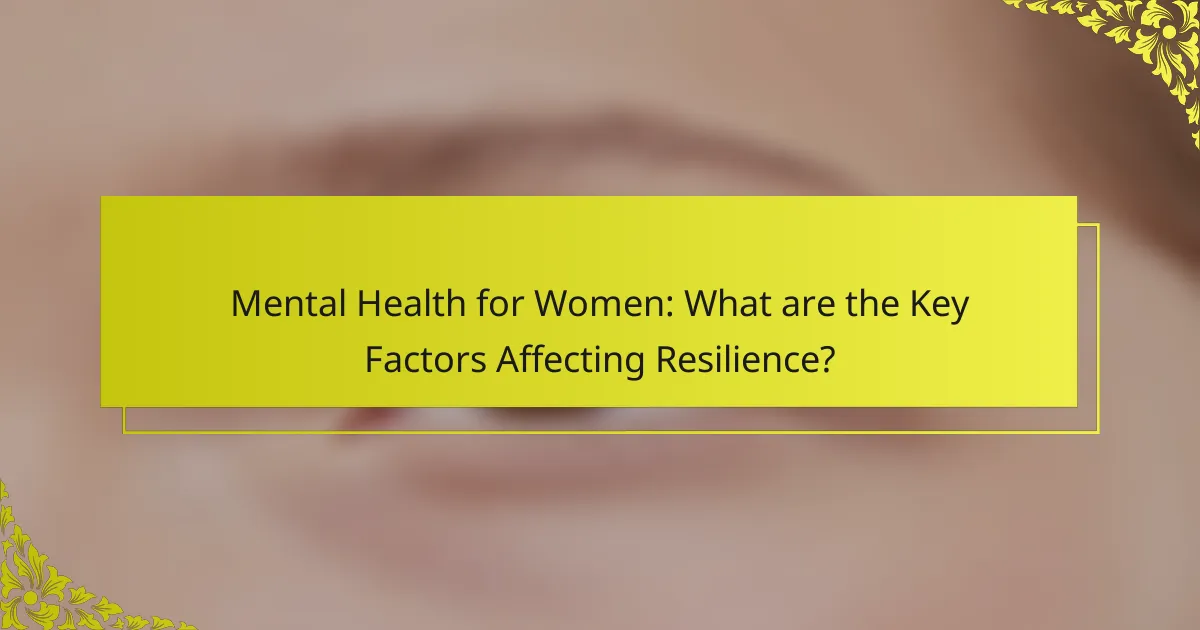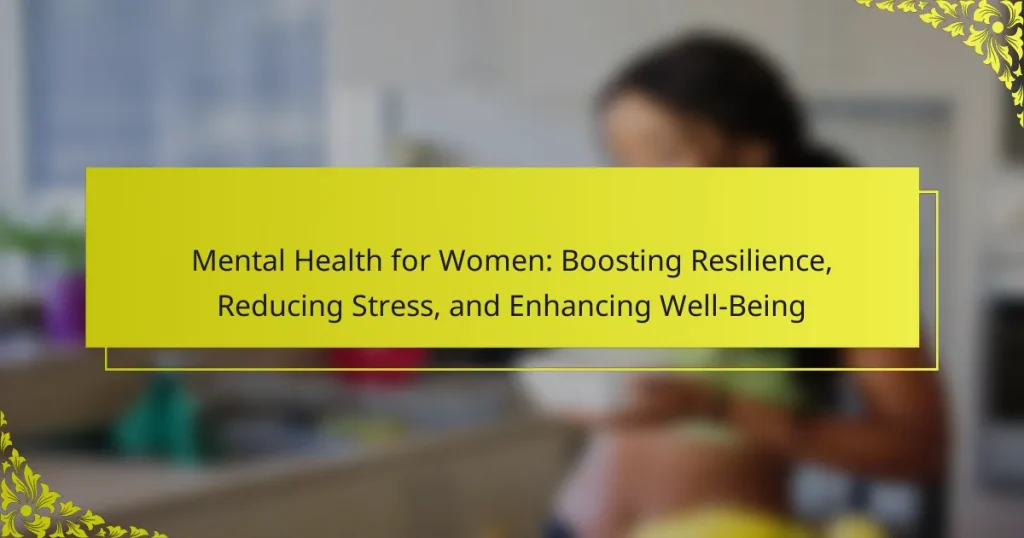Women face unique mental health challenges influenced by societal expectations and hormonal fluctuations. This article explores strategies to boost resilience, reduce stress through mindfulness and social support, and enhance overall well-being. It also discusses the importance of self-care and available resources for mental health support. Understanding these factors is essential for fostering mental resilience in women.

Mental Health for Women: What are the Key Factors Affecting Resilience?
Mental health for women is influenced by various factors that enhance resilience. Key factors include social support, coping strategies, and self-care practices. Social connections provide emotional strength, while effective coping strategies, such as mindfulness, can reduce stress levels. Additionally, prioritising self-care fosters overall well-being, contributing to greater resilience.
How do hormonal changes impact emotional well-being?
Hormonal changes significantly influence emotional well-being in women. Fluctuations in hormones, such as oestrogen and progesterone, can lead to mood swings, anxiety, and depression. These changes often occur during menstrual cycles, pregnancy, and menopause, impacting mental health. Research shows that women experiencing hormonal imbalances report higher stress levels and lower resilience. Addressing these hormonal shifts through lifestyle changes, therapy, or medical intervention can enhance emotional stability and overall well-being.
What role does social support play in mental health?
Social support significantly enhances mental health by providing emotional, informational, and practical assistance. It fosters resilience, reduces stress, and improves overall well-being among women. Studies show that strong social networks correlate with lower levels of anxiety and depression. For instance, women with supportive friendships report higher life satisfaction and better coping strategies during challenging times. This unique attribute of social support underscores its crucial role in promoting mental health.
How can life transitions affect stress levels?
Life transitions can significantly increase stress levels for women due to changes in roles and responsibilities. Major life events, such as marriage, motherhood, or career shifts, often lead to uncertainty and emotional strain. Research indicates that women are more likely to experience stress during these transitions compared to men, as they often juggle multiple responsibilities. Building resilience through support systems and self-care practices can mitigate these stress impacts. Engaging in mindfulness and physical activity has been shown to enhance well-being and reduce stress during challenging life phases.
What are common transitions women face?
Women commonly face transitions such as motherhood, career changes, aging, and relationship shifts. Each transition can impact mental health, requiring resilience and coping strategies. For example, motherhood often brings joy but also stress and identity changes. Career changes may lead to uncertainty and the need for adaptation. Aging can introduce health concerns and shifts in social roles. Relationship changes, whether through marriage or divorce, can significantly affect emotional well-being. Addressing these transitions effectively enhances well-being and reduces stress.
How can these transitions be navigated effectively?
Navigating transitions effectively involves building resilience through self-care practices, social support, and mindfulness techniques. Establishing a routine can enhance stability during changes. Engaging in physical activity and maintaining a balanced diet are essential for mental well-being. Seeking professional help when necessary can provide additional support and guidance.

What Unique Strategies Can Women Use to Reduce Stress?
Women can reduce stress through unique strategies like mindfulness, social support, and physical activity. Mindfulness practices enhance emotional regulation, while social connections provide essential support. Engaging in regular physical activity releases endorphins, promoting a sense of well-being. Additionally, establishing boundaries in personal and professional life can significantly lower stress levels. Prioritising self-care, such as hobbies or relaxation techniques, further contributes to resilience and overall mental health.
What are effective coping mechanisms for women?
Effective coping mechanisms for women include mindfulness practices, physical exercise, social support, and journaling. These strategies enhance resilience, reduce stress, and promote overall well-being. Mindfulness techniques, such as meditation and deep breathing, help manage anxiety. Regular physical activity releases endorphins, improving mood. Building a strong social network provides emotional support and reduces feelings of isolation. Journaling allows for self-reflection, helping women process emotions and experiences. Incorporating these mechanisms can lead to significant improvements in mental health.
How does physical activity influence mental health?
Physical activity significantly enhances mental health by boosting resilience, reducing stress, and improving overall well-being. Regular exercise releases endorphins, which are natural mood lifters. Studies show that women who engage in physical activity report lower levels of anxiety and depression. Additionally, exercise fosters social connections, which can further support mental health. Engaging in group activities or classes provides both physical benefits and emotional support, creating a unique attribute of community engagement. As a result, incorporating physical activity into daily routines is a powerful strategy for enhancing mental health in women.
What types of exercise are most beneficial?
Aerobic exercise, strength training, and yoga are most beneficial for mental health in women. Aerobic exercise, such as running or cycling, boosts mood and reduces anxiety. Strength training enhances self-esteem and resilience. Yoga promotes mindfulness and stress reduction. Each type contributes uniquely to overall well-being.
How can yoga and meditation support mental health?
Yoga and meditation significantly enhance mental health for women by boosting resilience, reducing stress, and enhancing overall well-being. These practices foster mindfulness, which helps in managing anxiety and promoting emotional stability.
Research shows that regular yoga practice can lower cortisol levels, the stress hormone, leading to improved mood and reduced feelings of tension. Meditation enhances self-awareness and emotional regulation, contributing to greater resilience in facing life’s challenges.
Furthermore, a study indicated that women who engage in yoga and meditation report higher levels of life satisfaction and lower rates of depression. The unique attribute of these practices is their ability to create a mind-body connection, which is essential for holistic mental health.
Incorporating yoga and meditation into daily routines can be a transformative approach for women seeking to improve their mental health and well-being.

What Rare Attributes Contribute to Women’s Mental Health Challenges?
Rare attributes influencing women’s mental health challenges include societal expectations, hormonal fluctuations, and caregiving responsibilities. These factors uniquely impact stress levels and emotional well-being. Societal pressures can lead to anxiety and depression, while hormonal changes during menstruation, pregnancy, and menopause can exacerbate mental health issues. Additionally, the burden of caregiving often results in diminished self-care, further affecting mental resilience. Understanding these rare attributes is essential for developing targeted interventions.
How do societal expectations impact mental resilience?
Societal expectations significantly influence women’s mental resilience by imposing pressures that can lead to stress and anxiety. Women often face conflicting roles, such as balancing career ambitions with family responsibilities, which can undermine their well-being. Research indicates that societal norms may dictate emotional responses, limiting women’s coping strategies. As a result, fostering supportive environments and promoting open discussions can enhance resilience and reduce stress.
What are the effects of chronic health conditions on mental well-being?
Chronic health conditions significantly impact mental well-being by increasing stress and anxiety levels. Women with chronic illnesses often experience feelings of isolation and reduced self-esteem. Studies show that these conditions can lead to depression, affecting daily functioning and overall quality of life. Addressing mental health in this context is crucial for improving resilience and well-being.

What are the Best Practices for Enhancing Well-Being?
To enhance well-being, women should focus on practices that boost resilience and reduce stress. Regular physical activity, mindfulness meditation, and maintaining strong social connections are key strategies. Engaging in hobbies and ensuring adequate sleep also significantly contribute to mental health. Prioritising self-care routines and seeking professional support when needed are essential for sustained well-being.
How can women create a balanced lifestyle?
Women can create a balanced lifestyle by prioritising mental health, resilience, and stress reduction. Incorporating mindfulness practices, such as meditation, promotes emotional well-being. Regular physical activity enhances mood and reduces anxiety. Establishing a supportive social network fosters connections, which are vital for resilience. Additionally, setting boundaries and managing time effectively can alleviate overwhelm. Engaging in hobbies and self-care activities nurtures personal fulfillment, contributing to overall well-being.
What are essential self-care strategies for mental health?
Essential self-care strategies for mental health include mindfulness practices, regular physical activity, and maintaining social connections. Mindfulness can reduce anxiety and improve emotional regulation. Engaging in physical activity releases endorphins, enhancing mood and resilience. Additionally, nurturing relationships provides support and decreases feelings of isolation. Prioritising sleep and nutrition further supports mental well-being. Incorporating these strategies fosters a holistic approach to enhancing mental health for women.
What common mistakes should be avoided in managing stress?
To manage stress effectively, avoid common mistakes such as neglecting self-care, ignoring emotional triggers, and failing to set boundaries. Prioritising mental health is essential for women to build resilience and enhance well-being.
Neglecting self-care can lead to burnout. Regular physical activity, balanced nutrition, and sufficient sleep are vital attributes that support stress management.
Ignoring emotional triggers prevents proper coping strategies. Identifying stressors allows for proactive measures, enhancing emotional resilience.
Failing to set boundaries can lead to overwhelm. Establishing clear limits protects personal time and mental space, fostering a healthier mindset.
In summary, focus on self-care, recognise emotional triggers, and set boundaries to effectively manage stress and promote mental health.
How can women seek professional help effectively?
Women can seek professional help effectively by identifying their specific mental health needs and finding a qualified provider. First, research local mental health professionals who specialise in women’s issues. Consider their credentials, experience, and treatment approaches. Next, schedule a consultation to discuss concerns and assess comfort levels. Utilise support networks, such as friends or family, for recommendations and encouragement. Lastly, be persistent; finding the right fit may take time, but it is crucial for enhancing well-being and resilience.

What Resources are Available for Women Seeking Support?
Various resources exist for women seeking mental health support, including therapy, support groups, and online platforms. Professional therapy offers personalised guidance, while support groups foster community and shared experiences. Online platforms provide accessible resources, including articles and forums, enhancing well-being. Women can also explore hotlines for immediate assistance. These resources collectively help boost resilience and reduce stress.
What organizations provide mental health resources for women?
Numerous organizations provide mental health resources specifically for women. Notable examples include the National Women’s Health Network, which offers advocacy and education, and the Women’s Mental Health Consortium, focusing on research and support. The Anxiety and Depression Association of America provides resources tailored to women’s mental health issues. Additionally, the American Psychological Association has dedicated programs addressing women’s mental health needs. These organizations aim to enhance well-being and resilience among women.
How can online communities support women’s mental health?
Online communities can significantly enhance women’s mental health by providing support, connection, and shared experiences. They create safe spaces for women to discuss challenges, reducing feelings of isolation. Research shows that social support is linked to lower stress levels and improved resilience.
Engagement in these communities fosters a sense of belonging and empowerment. Women can share coping strategies, access resources, and participate in discussions that promote mental well-being. Unique attributes of these communities include anonymity and accessibility, allowing women to seek help without fear of judgment.
As a result, online communities serve as vital platforms for mental health advocacy, facilitating discussions on issues like anxiety and depression. They can also host workshops and webinars that educate members about mental health, enhancing overall awareness and understanding.
In summary, online communities support women’s mental health by fostering connection, providing resources, and promoting resilience, ultimately enhancing well-being.
What are the benefits of therapy and counseling for women?
Therapy and counseling provide numerous benefits for women, including enhanced emotional resilience, reduced stress levels, and improved overall well-being. These services help women navigate life challenges, fostering personal growth and self-awareness.
Engagement in therapy can lead to better coping strategies, empowering women to manage anxiety and depression effectively. Research indicates that women who participate in counseling report higher satisfaction in relationships and improved communication skills.
Furthermore, therapy can address unique challenges women face, such as work-life balance and societal pressures, promoting mental health and self-advocacy. As a result, women often experience increased confidence and a greater sense of control over their lives.
In summary, therapy and counseling are vital tools for women, enhancing resilience, reducing stress, and fostering holistic well-being.




